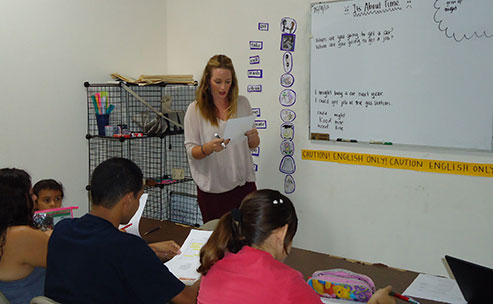Teaching English: Articles

Theories for learning TEFL methodology
By International Teacher Training Organization
There are many theories on learning Teaching English as a Foreign Language methodology. What we can conclude is that when we learn something, some sort of change has occurred within us. Also, we know that learning occurs through life and although it often takes place in a social context, it is a highly individualized process; we all have different learning styles. Theories on language learning and teaching evolve from the fields of psychology and linguistics.
One of the most recognized theories on learning called Behaviorism is based partly on the conditioned-reflex experiments by Ivan Pavlov, a Russian psychologist. Part of the theory in practice consists of providing a stimulus to cause a given response in a repetitive manner. American B.F. Skinner used these experiments to help create a therapy of behavior modification called conditioning. The audio-lingual language learning approach came about as a result of this learning theory; it involved a lot of listen/repeat exercises, transformation drills, and positive reinforcement.
Another relevant learning theory is known as Developmental Psychology, partially credited to Jean Piaget, who determined that learning takes place in four very predictable, sequential, innately determined stages. He made groundbreaking strides in early childhood development studies, and his experiments have been implemented with people of all ages. Some of his theories carry over into the realm of language learning and acquisition. He believed that language acquisition develops mainly from a combination or developmental readiness stages, social interaction, and an individual's unique interpretation process.
Piaget's theories led to the beginning of the Cognitive Learning Theories which considered behaviorism way too simplistic in explaining human learning. These theories establish that human beings learn through experiences - a life-long series of trial and error. Interpretation of experiences can lead to understanding or insight. That is, a human being goes through progressive cognitive experiences acquiring knowledge along the way with which to diagnose and solve problems. This process of figuring things out is more than just responding to a stimulus. These principles led to less mechanistic and more humanistic approaches in language learning.
Whether one agrees with previous theories for learning this methodology or not, the important implication in a course of English as a Foreign Language (E.F.L.) is that students learn -and acquire- a given language by means of eclectic (combination) approaches. Also, they learn and acquire language without even being aware of the existence of learning principles embedded in different learning theories.
As we learn relevant elements of the theories for learning teaching methodology and methodology necessary to become a language teacher, each one of us will come to the realization that the combination of theoretical preparation and teaching experience is the key element that will produce a good English language teacher. The teacher will choose and work with whatever materials, techniques and steps that work well for the learner, regardless of the theory of learning.
In other words, as teachers may apply the different theories of learning, they need to keep awareness that these theories are subjective by their own nature. It is impossible
Encyclopedia, Piaget, Jean,
Encyclopedia, Cognitive Learning,
*Feel free to share our articles, we only ask for credit! Be sure to mention International Teacher Training Organization as the author and a link back to our website: www.teflcertificatecourses.com.


 ITTO School's Map
ITTO School's Map MEXICO
MEXICO Guadalajara
Guadalajara Puerto Vallarta
Puerto Vallarta Chiapas
Chiapas Playa del Carmen
Playa del Carmen ARGENTINA
ARGENTINA Buenos Aires
Buenos Aires ITALY
ITALY Florence
Florence CANADA
CANADA Toronto
Toronto Vancouver
Vancouver CHINA
CHINA Shanghai
Shanghai COSTA RICA
COSTA RICA Manuel Antonio
Manuel Antonio Playa Samara
Playa Samara CZECH REPUBLIC
CZECH REPUBLIC Prague
Prague FRANCE
FRANCE Toulouse
Toulouse GUATEMALA
GUATEMALA Antigua
Antigua PERU
PERU Cusco
Cusco SPAIN
SPAIN Barcelona
Barcelona Madrid
Madrid THAILAND
THAILAND Chiang Mai
Chiang Mai USA
USA New York
New York Chicago
Chicago Miami
Miami Online TEFL Programs
Online TEFL Programs Compare Course Features
Compare Course Features














